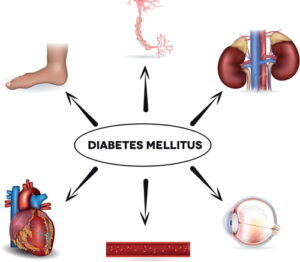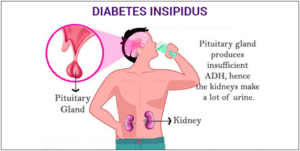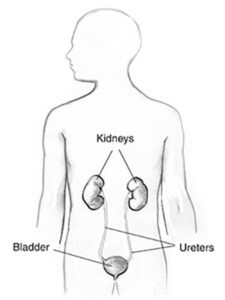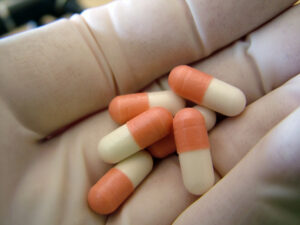Contents
Meaning Of Polyuria
Polyuria means excessive urination. This condition occurs when you drink an unusually large amount of water. This further leads to many medical issues such as diabetes mellitus and diabetes insipidus. In addition, medicines, coffee, alcohol, kidney disease, and electrolyte imbalance are the leading causes of polyuria. The kidneys produce urine by filtering water and particles from the liquids that we take after the circulatory system functions. The standard digits for the quantity of urine excreted by adults is 2.5 liters per day. Polyuria comes into the play when there are evidences of production of more than 3 liters of urine by an adult, regardless of how frequently he/she urinates.
Urination on a regular basis is a distinct problem. It may be linked to polyuria or nocturia (a condition when urination occurs at night when a person is sleeping). It is one of the most common symptoms of diabetes (both type 1 and type 2). Moreover, it can cause severe dehydration, which can damage the functioning o the kidneys over time if the patient does not get any suitable treatment.
Three P’s Of Diabetes
 The three P’s of diabetes are the most common symptoms of diabetes. They generally occur together. The expansion of these three P’s can be done as follows:
The three P’s of diabetes are the most common symptoms of diabetes. They generally occur together. The expansion of these three P’s can be done as follows:
Polydipsia
Polydipsia is a medical term that we use for excessive thirst. You may feel thirsty at all times or have a persistent dry mouth if you have polydipsia. High blood glucose levels in persons with diabetes cause polydipsia. When your blood glucose levels rise, your kidneys create more urine in an attempt to flush the excess glucose from your system. In the meantime, your brain encourages you to drink more to replace the fluids your body is losing. This causes acute thirst that is linked with diabetes.
Polyuria
When you pass more urine than usual, it is known as polyuria. A healthy person produces 1–2 liters of urine every day on an average (1 liter equals about 4 cups). Researchers characterize polyuria by the production of more than 3 liters of urine each day. When blood glucose levels are too high, your body will try to excrete some of the glucose through urination. This causes your kidneys to filter out more water, resulting in a greater desire to urinate.
Polyphagia
Excessive hunger is referred to as polyphagia. Although we all experience an increase in hunger in certain conditions, such as after exercise or when not eating anything for some time. It can also be an indication of a more serious problem. Glucose cannot enter the cells of diabetics to be used as energy. Low insulin levels resist the glucose from entering into the cells. This makes it challenging for a person with diabetes to produce energy, and as a consequence, the person feels extremely hungry. Even if you take your regular meals, the hunger does not fade away. Moreover, eating more to cope up with hunger adds glucose to the blood sugar making diabetes even more uncontrollable.
Causes of Polyuria
Not every person with polyuria has diabetes, but every person with diabetes develops polyuria at some or the other stage in life. Similarly, there can be many leading causes of polyuria, that has been discussed below:
Diabetes Mellitus
 One of the most common causes of polyuria is diabetes mellitus. High levels of glucose (blood sugar) build up in the tubules of your kidneys that causing your urine volume to rise. Insulin transports sugar from the bloodstream into your cells, where it is stored or used for energy. Your body either doesn’t generate enough insulin or can’t use the insulin it does make it efficiently if you have diabetes. If left untreated, then high blood sugar levels can harm your nerves, eyes, kidneys, and other organs. Some of the symptoms of diabetes mellitus are:
One of the most common causes of polyuria is diabetes mellitus. High levels of glucose (blood sugar) build up in the tubules of your kidneys that causing your urine volume to rise. Insulin transports sugar from the bloodstream into your cells, where it is stored or used for energy. Your body either doesn’t generate enough insulin or can’t use the insulin it does make it efficiently if you have diabetes. If left untreated, then high blood sugar levels can harm your nerves, eyes, kidneys, and other organs. Some of the symptoms of diabetes mellitus are:
- Blurred vision
- Frequent urination
- Increase in hunger
- Increase in thirst
- Weight loss
- Sores that don’t heal
Diabetes Insipidus
 Diabetes insipidus is a kind of diabetes in which your body does not produce enough antidiuretic hormone. This also causes your urine volume to rise. ADH, or vasopressin, is another name for antidiuretic hormone. Your pituitary gland produces ADH by involving in the fluid absorption process in your kidneys. Even if you have a drink a lot of water, then also it makes you thirsty. Many people find the phrases “diabetes insipidus” and “diabetes mellitus” as similar. But they are not the same thing. Diabetes mellitus, sometimes known as diabetes, is a condition characterized by excessive blood sugar levels and can be classified as type 1 diabetes or type 2 diabetes. They both differ from each other. Some of the symptoms of diabetes insipidus are:
Diabetes insipidus is a kind of diabetes in which your body does not produce enough antidiuretic hormone. This also causes your urine volume to rise. ADH, or vasopressin, is another name for antidiuretic hormone. Your pituitary gland produces ADH by involving in the fluid absorption process in your kidneys. Even if you have a drink a lot of water, then also it makes you thirsty. Many people find the phrases “diabetes insipidus” and “diabetes mellitus” as similar. But they are not the same thing. Diabetes mellitus, sometimes known as diabetes, is a condition characterized by excessive blood sugar levels and can be classified as type 1 diabetes or type 2 diabetes. They both differ from each other. Some of the symptoms of diabetes insipidus are:
- Extreme thirst
- Preferring cold drinks
- Producing large amounts of pale urine
- Frequently needing to get up to urinate during the night
Nephrogenic Diabetes Insipidus
 If there isn’t enough ADH produced, then your urine volume may increase. It can also rise if your kidneys are unable to regulate the amount of fluid going through them. Nephrogenic diabetes insipidus is the medical term for this condition. Moreover, if your doctor suspects diabetes is the cause of your polyuria, he or she will take your blood glucose test. If polyuria causes by any type of diabetes, then your doctor will offer therapy and lifestyle modifications to help you manage your diabetes. Symptoms of nephrogenic diabetes insipidus are:
If there isn’t enough ADH produced, then your urine volume may increase. It can also rise if your kidneys are unable to regulate the amount of fluid going through them. Nephrogenic diabetes insipidus is the medical term for this condition. Moreover, if your doctor suspects diabetes is the cause of your polyuria, he or she will take your blood glucose test. If polyuria causes by any type of diabetes, then your doctor will offer therapy and lifestyle modifications to help you manage your diabetes. Symptoms of nephrogenic diabetes insipidus are:
- Heavy, wet diapers
- Bed-wetting
- Trouble sleeping
- Fever
- Vomiting
- Constipation
- Delayed growth
- Weight loss
Some of the treatments include:
- Exercise
- Dietary changes
- Insulin injections
- Oral medications
Symptoms Of Polyuria
Polyuria can occur in patients diagnosed with diabetes if there is a high blood glucose level. It can also occur in people who are facing indications of undiagnosed diabetes. Polyuria as such has one symptom in common that is too much urination. However, depending on the condition or disease, polyuria can also have some additional symptoms. The most common sign of polyuria is the production of abnormally large amounts of urine at regular intervals throughout the day and night. It also causes frequent urination, especially at night (nocturia). If you’re thinking about how much urine you’re producing or you could have polyuria, then keep track of how much you drink, how often you urinate, and how much urine you generate every time you go to the bathroom.
Causes Of Polyuria
There are a variety of factors that causes polyuria. It is ranging from drinking too much water to a significant health issue such as renal failure. The following are the most common causes of polyuria.
Diabetes Mellitus
Diabetes mellitus is a condition that characterizes by the body’s failure to regulate blood sugar effectively. It can be due to a lack of insulin resistance or production. Because of the elevated sugar levels in diabetes, the bloodstream has a higher osmolarity.
Diabetes Insipidus
Diabetes insipidus is not the same as diabetes mellitus. It has nothing to do with blood sugar levels. Instead, polyuria links to diabetes insipidus because of its antidiuretic hormone, and Arginine Vasopressin (AVP). Because of a neurological problem, a lack of arginine vasopressin production causes diabetes insipidus. The failure of the kidney to respond to AVP causes nephrogenic diabetes insipidus. A medical or traumatic brain injury might cause central diabetes insipidus. In most cases, nephrogenic diabetes insipidus is hereditary.
Diuretic Medications
 To address illnesses including congestive heart failure and high blood pressure, several medicines use as to prevent excessive urine. If the dosages are incorrect, these drugs can cause polyuria. To reduce needless urination, your doctor will change the dosage of your medications as per your requirement.
To address illnesses including congestive heart failure and high blood pressure, several medicines use as to prevent excessive urine. If the dosages are incorrect, these drugs can cause polyuria. To reduce needless urination, your doctor will change the dosage of your medications as per your requirement.
Lithium
 Lithium is a psychiatric drug used to treat mood disorders. It is almost damaging excessive urine from the body. Those patients who take it on a regular basis can have a significant impact on the kidneys. As result, polyuria and polydipsia can occur with lithium-induced nephrogenic diabetes insipidus. If polyuria is present and lithium is not stopped, irreparable kidney damage might occur, resulting in permanent polyuria.
Lithium is a psychiatric drug used to treat mood disorders. It is almost damaging excessive urine from the body. Those patients who take it on a regular basis can have a significant impact on the kidneys. As result, polyuria and polydipsia can occur with lithium-induced nephrogenic diabetes insipidus. If polyuria is present and lithium is not stopped, irreparable kidney damage might occur, resulting in permanent polyuria.
Alcohol/Caffeine Intake
 Both caffeine and alcohol have diuretic properties. Excessive use of either of these beverages can cause polyuria. It can lead to dehydration. Even for persons who consume alcohol on a regular basis, then also it is a diuretic for those people. Caffeine’s diuretic effects can fade over a period of time in persons who use it on a daily basis.
Both caffeine and alcohol have diuretic properties. Excessive use of either of these beverages can cause polyuria. It can lead to dehydration. Even for persons who consume alcohol on a regular basis, then also it is a diuretic for those people. Caffeine’s diuretic effects can fade over a period of time in persons who use it on a daily basis.
Diagnosis Of Polyuria
Polyuria is a symptom, not a medical illness. There is no diagnosis for this symptom. The above causes of polyuria can help in identifying the symptom that arises after diagnosis. Each cause requires a distinct approach for diagnosing. In every situation, the doctor will start by determining when polyuria first appeared and whether it appeared suddenly or progressively over time.
Diabetes Mellitus VS Diabetes Insipidus
If polyuria develops after a major neurological event, such as a stroke or severe brain damage, it could be a marker of central diabetes insipidus. Polyuria and polydipsia are symptoms of diabetes mellitus and diabetes insipidus, respectively. Both illnesses are serious and necessitate additional treatment or diagnosis. The doctor will want to check the patient’s hemoglobin A1C, which is a blood test that assesses the average blood glucose levels over the past six months retroactively. The doctor conducts a urine glucose test to examine if the body is excreting sugar in the urine. This is to know that whether it is an indication of diabetes mellitus or not.
Treatment Of Polyuria
 The most effective treatment for polyuria is to target the source of the problem. Lithium-induced nephrogenic diabetes insipidus is a cure for stopping lithium. Diabetes mellitus which causes polyuria is likely to improve if the patient’s blood glucose levels are under control. Polyuria that cannot be resolved by addressing the underlying cause is frequently treated with a variety of drugs for various types of diabetes. You can distinguish polyuria by the diluted form of the urine produced, which contains more water than urine. Giving a form of diuretic, which improves the way urine is processed in the kidneys and so increases urine production, is one of the treatments for polyuria.
The most effective treatment for polyuria is to target the source of the problem. Lithium-induced nephrogenic diabetes insipidus is a cure for stopping lithium. Diabetes mellitus which causes polyuria is likely to improve if the patient’s blood glucose levels are under control. Polyuria that cannot be resolved by addressing the underlying cause is frequently treated with a variety of drugs for various types of diabetes. You can distinguish polyuria by the diluted form of the urine produced, which contains more water than urine. Giving a form of diuretic, which improves the way urine is processed in the kidneys and so increases urine production, is one of the treatments for polyuria.
Conclusion
Polyuria is not a predictor of weaning success. It is a predictor of mechanical ventilation duration and is likely to connect with subclinical renal dysfunction. The above article also tells about the relationship between polyuria and diabetes, polyuria symptoms, its causes, and its treatment.
Do you want to get rid of diabetes? Join our online diabetes consultation program and reverse your Diabetes naturally through lifestyle changes such as a Personalized Diet plan, Exercise, dieticians, and health coaches.


